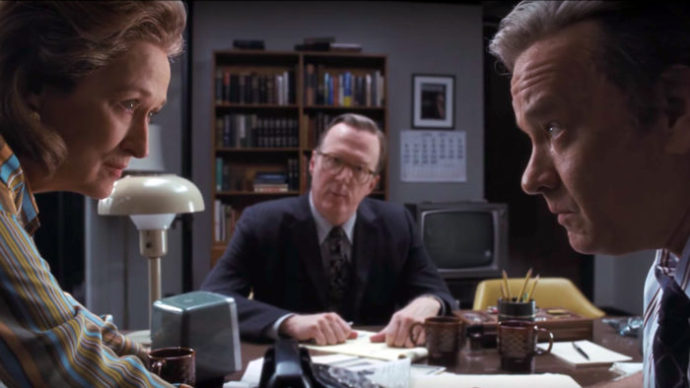With the current administration declaring war against any non-conservative media, all the while hiding government secrets and potential collusion with Russia, it would only make sense a film about brave reporters publishing and exposing the government’s hidden secrets would be in development. Lo and behold, the great Steven Spielberg himself had been put to the task, detailing the story of the Washington Post publishing the infamous Pentagon Papers. As to be expected, Spielberg’s The Post delivers, with impeccable direction and one of the best Meryl Streep performances in years.
With Spielberg as a director, he brings along with him several collaborators, including Rick Carter as the production designer, Janusz Kamiński as the cinematographer, and Michael Kahn as the editor, and with their strong camraderie, it leads to a tightly-wound film that is always engaging, always exciting, and always entertaining. With such sharp pacing, smooth cinematography, and a perfect recreation of 1960s America, The Post works as a strong period piece that effectively captures the hysteria and government distrust that was rampant at that time period.
The film also boasts an incredible cast of Hollywood superstars and distinct character actors, though some are given more to chew on than others. The stand-out perfomer of the bunch is Meryl Streep as Kay Graham, in what is quite possibly one of her strongest performances in years. Through distinct subtle beats in the script and her performance, we see Graham as a woman proving herself in a male-dominated industry, while also dealing with the stigmatization of earning ownership of The Washington Post due to being the daughter of the former owner. Several sequences that show her forced to stay quiet due to the societal pressures in her environment, and the constant dismissal of her ideas, only for them to later be restated by another man in the building to approval is disheartening and anger-inducing for the audience, and Streep pulls off these complicated emotions and disgusting gender politics through subtle facial and vocal expressions, and a soft-spoken, yet still powerful, intelligent, and triumphant personality, making her the strongest element of all of the cast members.
Tom Hanks as Ben Bradlee is entertaining and a highly enjoyable performance (after all, it is Tom Hanks) but it didn’t necessarily click as much as Hanks’ other recent dramatic work. His voice in the film, which attempts to be gruff and scratchy, is incredibly distracting, and he never quite sells himself as the brash and determined editor in chief. The real standout performer, when it comes to the men, is Bob Odenkirk as assistant editor Ben Bagdikan. His subplot where he attempts to earn the documents is richly entertaining, and Odenkirk offers a lot of likability, while also delivering on the urgency and determination on getting the papers published and to call out the government for its abhorrent actions.
In the case of the large supporting cast, only a few manage to deliver anything truly noteworthy or memorable, though it is understandable, as this film is executed like the “Hanks/Streep/Odenkirk” show. Bruce Greenwood as Robert McNarama is entertaining, as is David Cross as Howard Simons. Alison Brie also gets a decent amount of time to shine as Kay Graham’s daughter Lally. Cross’ casting also shows Spielberg is a Mr. Show fan. Unfortunately, Sarah Paulson is completely shafted, portraying the nervous housewife to Hanks. Her talents are severely wasted, and it’s disappointing Spielberg would have the eye-rolling cliche of having two actors attempt to play husband and wife and yet the two share a massive age gap with one another.
Regardless, the one element that truly ties this film together, and elevates it into something great is the screenplay written by Liz Hannah and Josh Singer. Singer, who had previously done the screenplay for the 2015 film Spotlight, goes back to his wheelhouse and works with Hannah, a newcomer to the writing field, and manages to deliver a high-octane, quick-witted, and highly engaging storyline that encompasses themes of sexism, freedom of the press, and political corruption into a well-paced and nail-biting drama, showcasing the wild world of journalism, the sacrifices journalists are sometimes forced to make, and journalism’s importance within society, all tied up in a brilliant ending that gives a nod to the corrupt Nixon and Trump administrations.
As a both a celebration of journalism and a showcase of powerhouse actors, The Post delivers as a gripping drama with suspense, bite, and excitement, thanks to a killer screenplay, and fantastic direction. Spielberg delivers once again, creating a timely, powerful feature.
